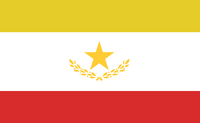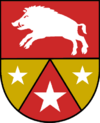Politics of Littland: Difference between revisions
mNo edit summary |
mNo edit summary |
||
| Line 37: | Line 37: | ||
{{Main|History of Littland}} | {{Main|History of Littland}} | ||
==Constitution== | ==Constitution== | ||
The current Constitution of Littland (Littlands Grundlov) is from 1986, after several changes were made to the power vested in the President, Folkekammer threshold, responsibility of the Prime Minister among others. According to the constitution, legislative powers are vested in and executed by the Folkekammer. Governmental powers are primarily executed by the Prime Minister, while the President is responsible for leading foreign policy as well as serving as commander-in-chief of Forsvarsstyrken. Additionally, judges, ministers and other important positions are formally appointed by the President. The President has veto-power over legislation, however this can be overturned by the Folkekammer. | The current Constitution of Littland (Littlands Grundlov) is from 1986, after several changes were made to the power vested in the President, Folkekammer election threshold, responsibility of the Prime Minister among others. According to the constitution, legislative powers are vested in and executed by the Folkekammer. Governmental powers are primarily executed by the Prime Minister, while the President is responsible for leading foreign policy as well as serving as commander-in-chief of Forsvarsstyrken. Additionally, judges, ministers and other important positions are formally appointed by the President. The President has veto-power over legislation, however this can be overturned by the Folkekammer. | ||
[[File:Political System of Littland.svg|center|thumb|626px|{{center|The Political System of Littland}}]] | [[File:Political System of Littland.svg|center|thumb|626px|{{center|The Political System of Littland}}]] | ||
==Executive== | ==Executive== | ||
Littland is a parliamentary republic, even if the President is responsible for foreign affairs. Most executive power lies in the government led by the Prime Minister. Forming a government is the task of the leader of the largest political party after an election, who also becomes Prime Minister. Any government must have the continued support of the parliament, who can engage a constructive vote of no confidence, to replace the government at any time. | |||
===President=== | ===President=== | ||
{{Main|President of Littland}} | {{Main|President of Littland}} | ||
Despite the parliamentary nature of Littish politics, the President has some noteworthy powers. Following the 1986 rewrite of the constitution however, the Presidents powers have been quite limited compared to earlier. | |||
===Prime Minister=== | ===Prime Minister=== | ||
{{Main|Prime Minister of Littland}} | {{Main|Prime Minister of Littland}} | ||
===Government=== | ===Government=== | ||
{{Main|Government of Littland}} | {{Main|Government of Littland}} | ||
==Folkekammer== | ==Folkekammer== | ||
Revision as of 12:21, 22 August 2022
 Flag of Littland | |
| State type | Unitary parliamentary republic |
|---|---|
| Constitution | Constitution of Littland |
| Legislative branch | |
| Name | Folkekammer |
| Type | Unicameral |
| Meeting place | Tinghuset |
| Presiding officer | Inger Knudsen, Speaker of the Folkekammer |
| Executive branch | |
| Head of State | |
| Title | President |
| Currently | Morten Kristoffersen |
| Appointer | Popular vote |
| Head of Government | |
| Title | Prime Minister |
| Currently | Albert Simonsen |
| Appointer | President |
| Cabinet | |
| Name | Littish Government |
| Current cabinet | Simonsen II Cabinet |
| Leader | Prime Minister |
| Appointer | President |
| Headquarters | Tinghuset |
| Ministries | 13 |
| Judicial branch | |
| Name | Judicial System of Littland |
| Chief judge | Gabriel Matthiasen |
 |
|---|
| This article is part of a series on the politics and government of Littland |
|
|
The politics of Littland takes place within the constitutional framework of a parliamentary republic. Littland is a republic whose head of state is President Morten Kristoffersen who leads the nations foreign policy. Littlands head of government is Prime Minister Albert Simonsen who leads the executive branch of the Littish Government. Legislative powers are vested in the 325 seat Folkekammer, the Littish parliament, which is elected every 4 years. The judiciary is independent of the executive and legislative branches.
Littish citizens enjoy individual and political freedom, suffrage is universal at age 18. Freedom of speech and expression are highly valued by Litts.
History
Constitution
The current Constitution of Littland (Littlands Grundlov) is from 1986, after several changes were made to the power vested in the President, Folkekammer election threshold, responsibility of the Prime Minister among others. According to the constitution, legislative powers are vested in and executed by the Folkekammer. Governmental powers are primarily executed by the Prime Minister, while the President is responsible for leading foreign policy as well as serving as commander-in-chief of Forsvarsstyrken. Additionally, judges, ministers and other important positions are formally appointed by the President. The President has veto-power over legislation, however this can be overturned by the Folkekammer.
Executive
Littland is a parliamentary republic, even if the President is responsible for foreign affairs. Most executive power lies in the government led by the Prime Minister. Forming a government is the task of the leader of the largest political party after an election, who also becomes Prime Minister. Any government must have the continued support of the parliament, who can engage a constructive vote of no confidence, to replace the government at any time.
President
Despite the parliamentary nature of Littish politics, the President has some noteworthy powers. Following the 1986 rewrite of the constitution however, the Presidents powers have been quite limited compared to earlier.
Prime Minister
Government
Folkekammer
The Folkekammer has 325 seats and is elected every four years based on proportional representation. Its tasks are to pass laws, approve the state budget and international treaties, and supervise the activities of the government. The 325 members are elected on the basis of proportional representation every four years.
Political Parties
Elections
Administrative divisions
Littland has 16 counties including 1 capital region and 1 autonomous zone, those being Kaslund and the Malskland
| The State | County | Municipality |
|---|---|---|
| Defence | Hospitals | Eldercare |
| Higher education | Secondary education | Primary education |
| Highways | Major roads | Local roads |
| Central administration | Museums | Basic utilities |
| Postal service | Benefits | Childcare |
| National parks | Waste disposal | Local permits |
Foreign Relations

